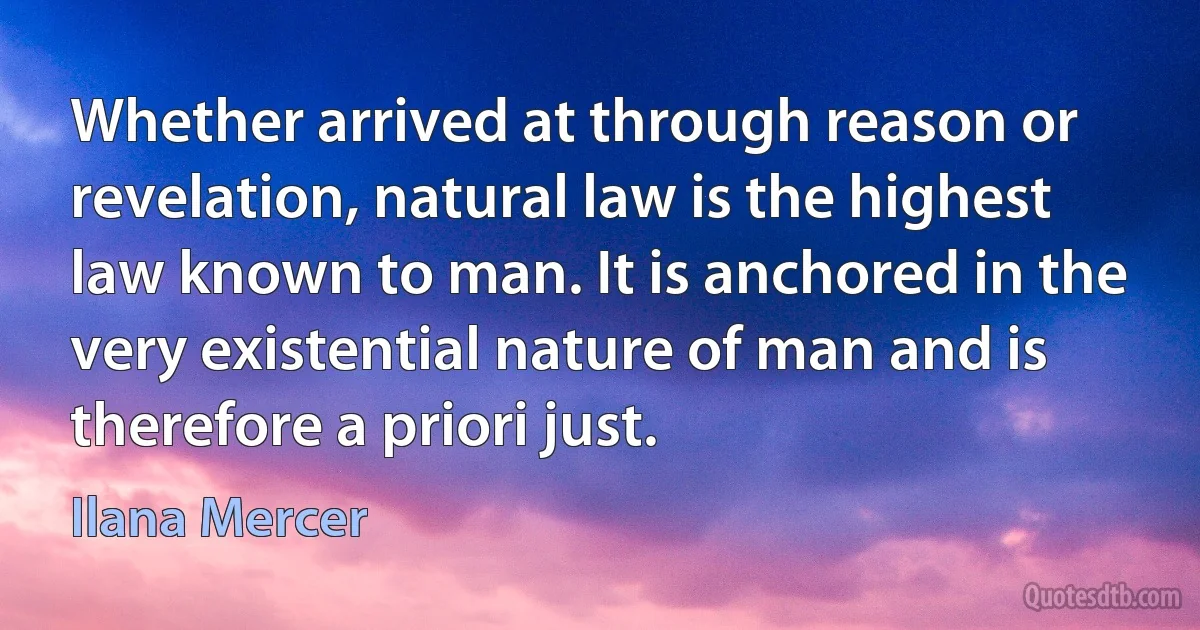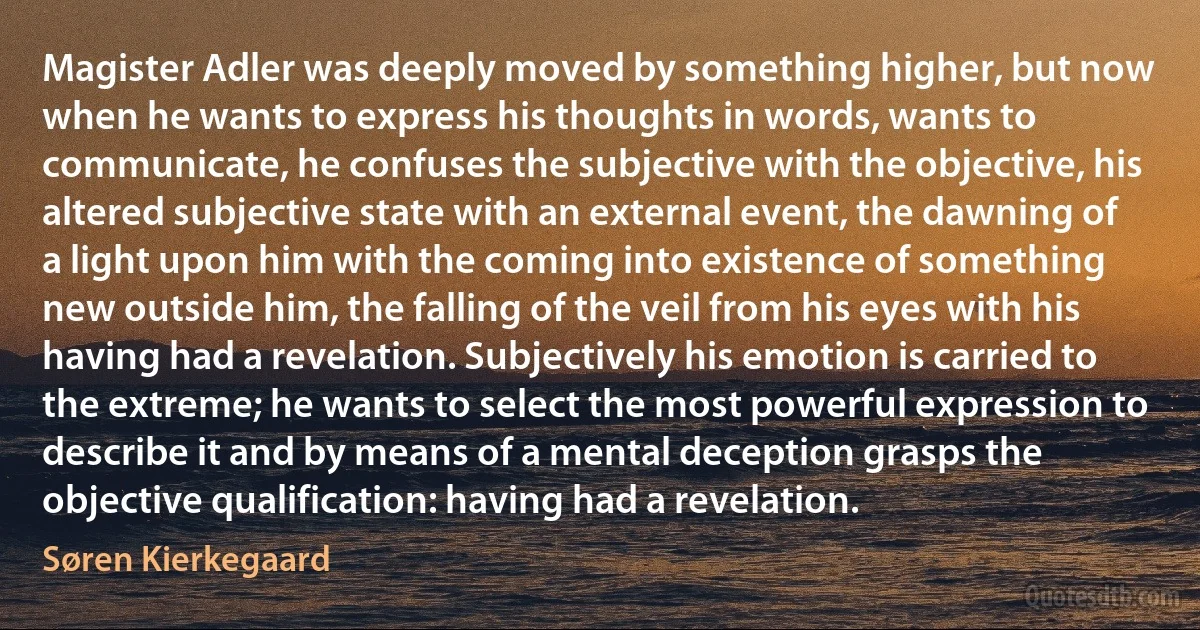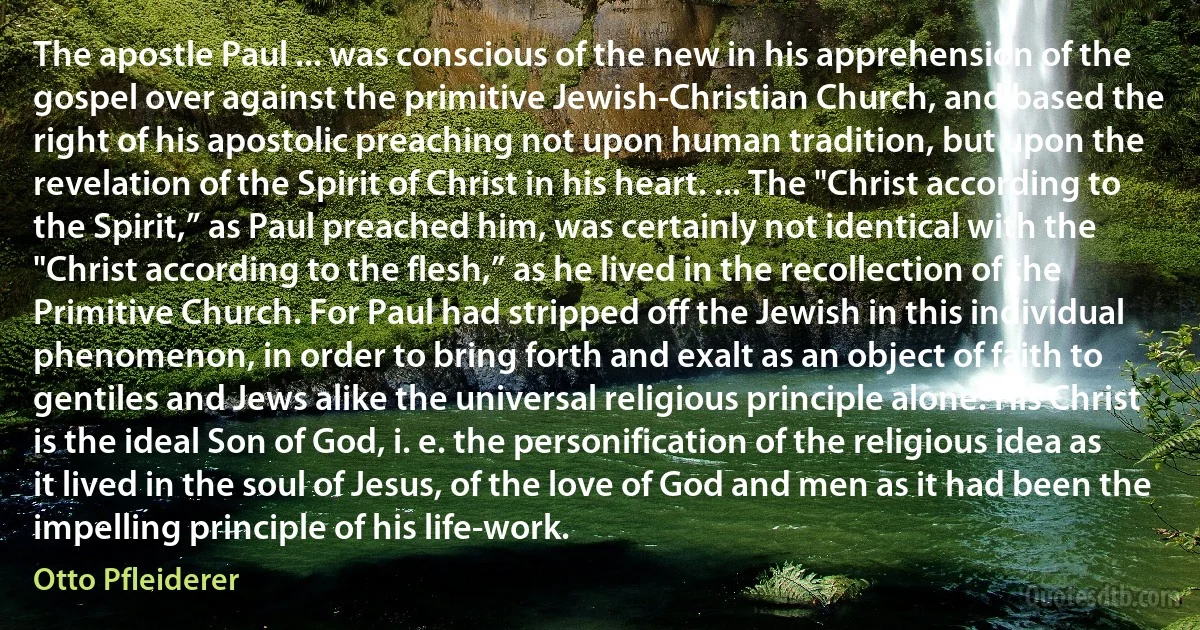Revelation Quotes - page 10
Pietism and methodism reemphasized personal guilt, personal experience, and individual perfection. They were not intended to deviate from ecclesiastical conformity, but unavoidably they did deviate; subjective piety became the bridge of the victorious reappearance of autonomous reason. Pietism was the bridge to Enlightenment. But even Enlightenment did not consider itself individualistic. One believed not in a conformity which is based on biblical revelation but in one which should be based on the power of reason in every individual. The principles of practical and theoretical reason were supposed to be universal among men and able to create, with the help of research and education, a new conformity.

Paul Tillich
In many ways art is similar to religion. Its development consists not in new discoveries which invalidate the old truths (as is obviously the case in science). Its development consists in sudden illuminations, similar to lightning, in explosions, which burst in the sky like fireworks.... this illumination shows with blinding light new perspectives, new truths, which are basically nothing but the organic development, the further organic growth of the earlier wisdom... Was the New Testament possible without the Old? Could our time, that of the threshold of the 'third' revelation, be thinkable without the second?

Wassily Kandinsky
For one thing, Christian doctrine is from first to last a historical construct. Its content rests on the historical revelation of God in the historical figure of Jesus Christ and on the precise evaluation, by historical interpretation alone, of the testimony that early Christian proclamation gives to this figure.

Wolfhart Pannenberg
So I made a mistake. That happens. It proves I'm human, which you know, for some people, is a revelation.... I was also told that the greeting ceremony had been moved away from the tarmac but that there was this eight-year-old girl and I said, 'Well, I, I can't, I can't rush by her, I've got to at least greet her.' So I greeted her, I took her stuff and I left. Now that's my memory of it.

Hillary Clinton
Or say it is Pentecost: the hawthorn-tree,
set with coagulate magnified flowers of may,
blooms in a haze of light; old chalk-pits brim
with seminal verdue from the roots of time.
Landscape is like revelation; it is both
singular crystal and the remotest things.
Cloud-shadows of seasons revisit the earth,
odourless myrrh bourne by the wandering kings.

Geoffrey Hill
If God stops a man on the road, and calls him with a revelation and sends him armed with divine authority among men, they say to him; from whom dost thou come? He answers: from God. But now God cannot help his messenger physically like a king, who gives him soldiers or policemen, or his ring or his signature, which is known to all; in short, God cannot help men by providing them with physical certainty that an Apostle is an Apostle-which would, moreover, be nonsense. Even miracles, if the Apostle has that gift, give no physical certainty; for the miracle is the object of faith.

Søren Kierkegaard
Father, I am greatly disturbed by a vision which has appeared to me through divine revelation, a vision seen not with my fleshly eyes but only in my spirit. Wretched, and indeed more than wretched in my womanly condition, I have from earliest childhood seen great marvels which my tongue has no power to express but which the Spirit of God has taught me that I may believe." Steadfast and gentle father, in your kindness respond to me, your unworthy servant, who has never, from her earliest childhood, lived one hour free from anxiety. In your piety and wisdom look in your spirit, as you have been taught by the Holy Spirit, and from your heart bring comfort to your handmaiden.

Hildegard of Bingen
The work itself, whether thought of as image of idea, as revelation, or as a manifest of meaning, could not have existed without a profound concern to achieve a purpose beyond vanity, ambition or remembrance, for a man's term of life. Yet, while one looks at his works, a warning should be given, lest one forget, among the multitude of issues, the relation I bear to those with 'eyes'. Although the reference is in a different context and for another purpose, a metaphor is pertinent as William Blake set it down: THE Vision of Christ that thou dost see – Is my Vision's Greatest Enemy: - Thine is the friend of All Mankind, - Mine speaks in parables to the Blind: 'Therefore, let no man under-value the implications of this work or its power for life; - or for death, if it is misused'.

Clyfford Still
Attack of the Clones displays some similarities to The Empire Strikes Back, but, overall, it is not as effective a piece of cinema (although the 2002 era special effects make it far more pleasing to the eye). Both films contain romantic subplots and are darker in tone than their predecessors. Both develop a number of unresolved plot elements. And both end on a note that incorporates hope with ambiguity. There is, however, one major difference. The Empire Strikes Back includes a shocking revelation. Nothing of that sort is present in Attack of the Clones. In terms of its plotting, this film is relatively straightforward. There's nothing wrong with that - in fact, it works. In a time when, more often than not, sequels disappoint, it's refreshing to uncover something this high-profile that fulfills the promise of its name and adds another title to a storied legacy.

James Berardinelli
The meaning of the living words that come out of the experiences of great hearts can never be exhausted by any one system of logical interpretation. They have to be endlessly explained by the commentaries of individual lives, and they gain an added mystery in each new revelation.

Rabindranath Tagore
The divine in Jesus does not denote a violent rupture of the course of human history with the exclusion of all causal connection and all human personality, but it lies at the basis of all this history from beginning to end; it dwells in it as the divine Logos, as the rational aptitude of human nature, as impulse to the true and good, as God-consciousness. All progress in the development of mankind from the lowest grades upward, every achievement of culture which makes rude nature the servant of reason, every formation of higher ethical ideals, and every clarifying and deepening of the God-consciousness, is an effect and a revelation of the divine Logos dwelling in our race.

Otto Pfleiderer
Especially do the evils of the times, the folly and blindness of the masses, the injustice of rulers, the perversion of religion in unfruitful ceremonialism work upon the souls more finely attuned as a stimulus and spur; the feeling of the evil stirs their moral judgment or conscience to the criticism of the existing situation, and out of the criticism there grows for them the new ideal which impresses itself upon them as the truth that has the power to save from the corruption of the time; and while they first raise themselves to this ideal, they also win power and courage to draw others toward it. Thus they become the proclaimers of a higher truth which, over against the antecedent error, appears as something wholly new, as a revelation from above, but which is, indeed, nothing else than a higher development of the impulse toward truth and righteousness that is a natural quality of the human mind.

Otto Pfleiderer
Although I came to doubt all revelation, I can never accept the idea that the Universe is a physical or chemical accident, a result of blind evolution. Even though I learned to recognize the lies, the clichés and the idolatries of the human mind, I still cling to some truths which I think all of us might accept some day. There must be a way for man to attain all possible pleasures, all the powers and knowledge that nature can grant him, and still serve God - a God who speaks in deeds, not in words, and whose vocabulary is the Cosmos.

Isaac Bashevis Singer
If it is the drive of our time, after freedom of thought is won, to pursue it to that perfection through which it changes to freedom of the will in order to realize the latter as the principle of a new era, then the final goal of education can no longer be knowledge, but the will born out of knowledge, and the spoken expression of that for which it has to strive is: the personal or free man. Truth consists in nothing other than man's revelation of himself, and thereto belongs the discovery of himself, the liberation from all that is alien, the uttermost abstraction or release from all authority, the re-won naturalness. Such thoroughly true men are not supplied by school; if they are there, they are there in spite of school.

Max Stirner



